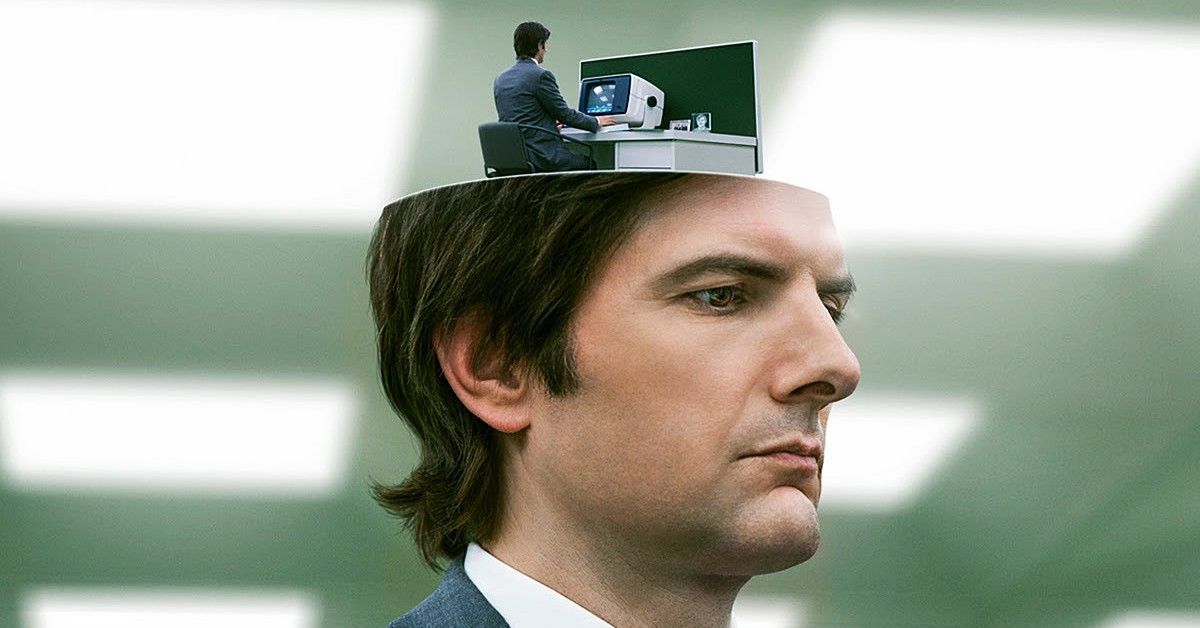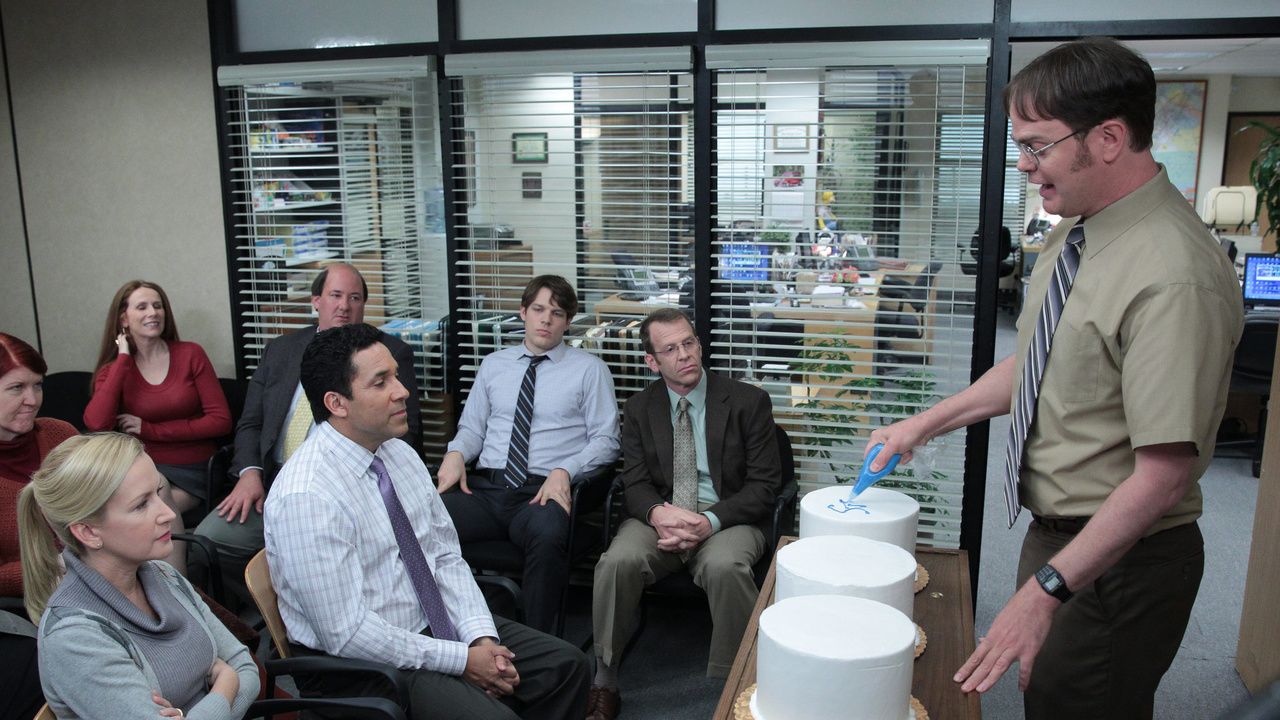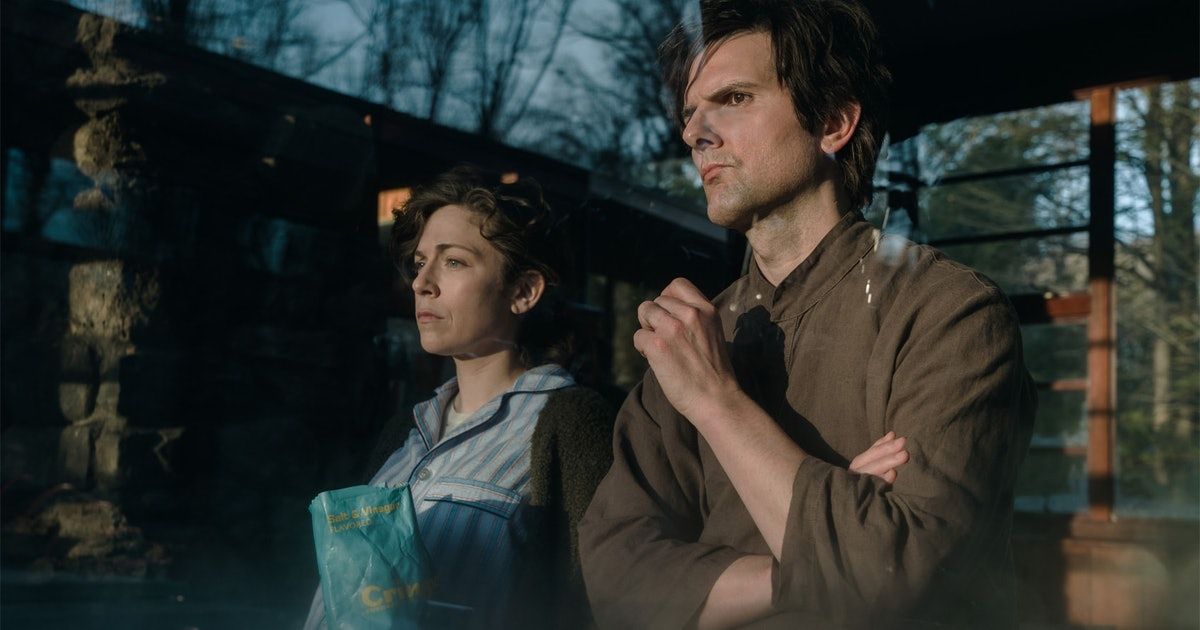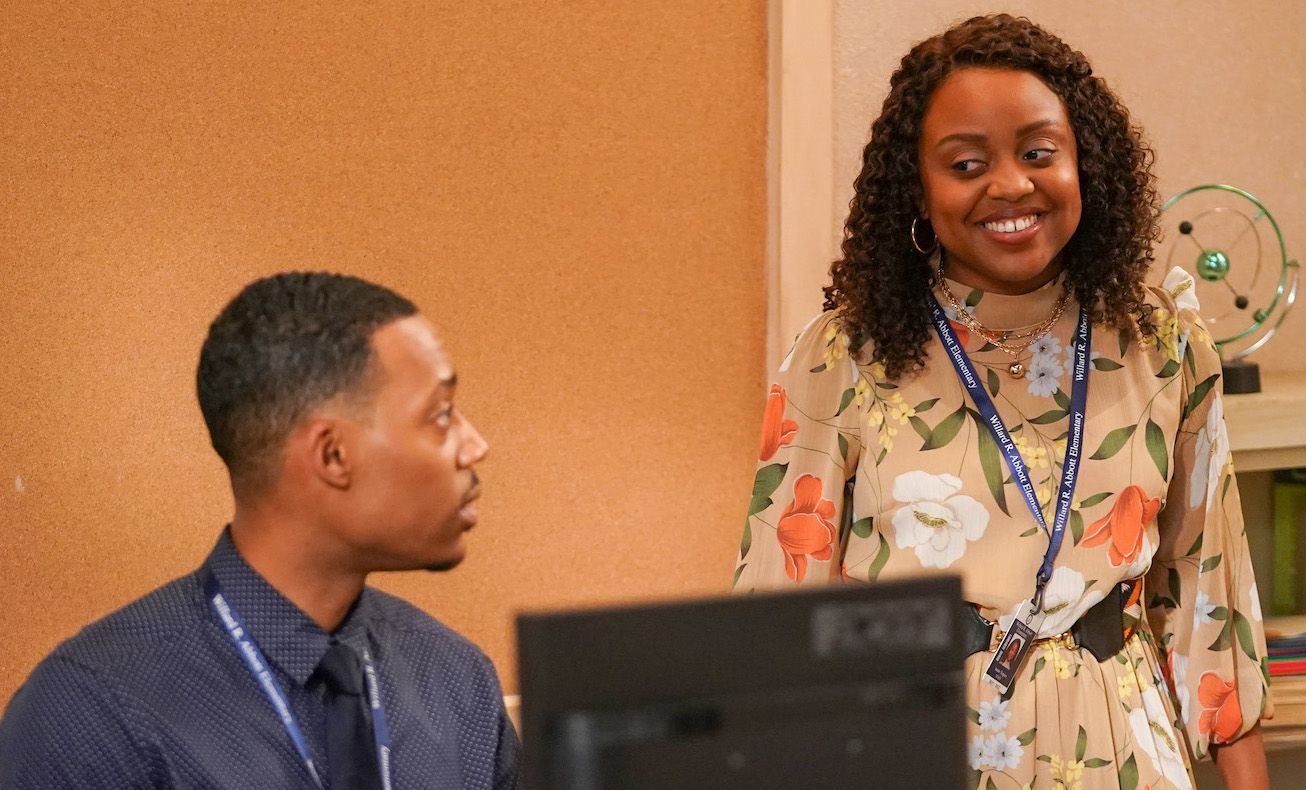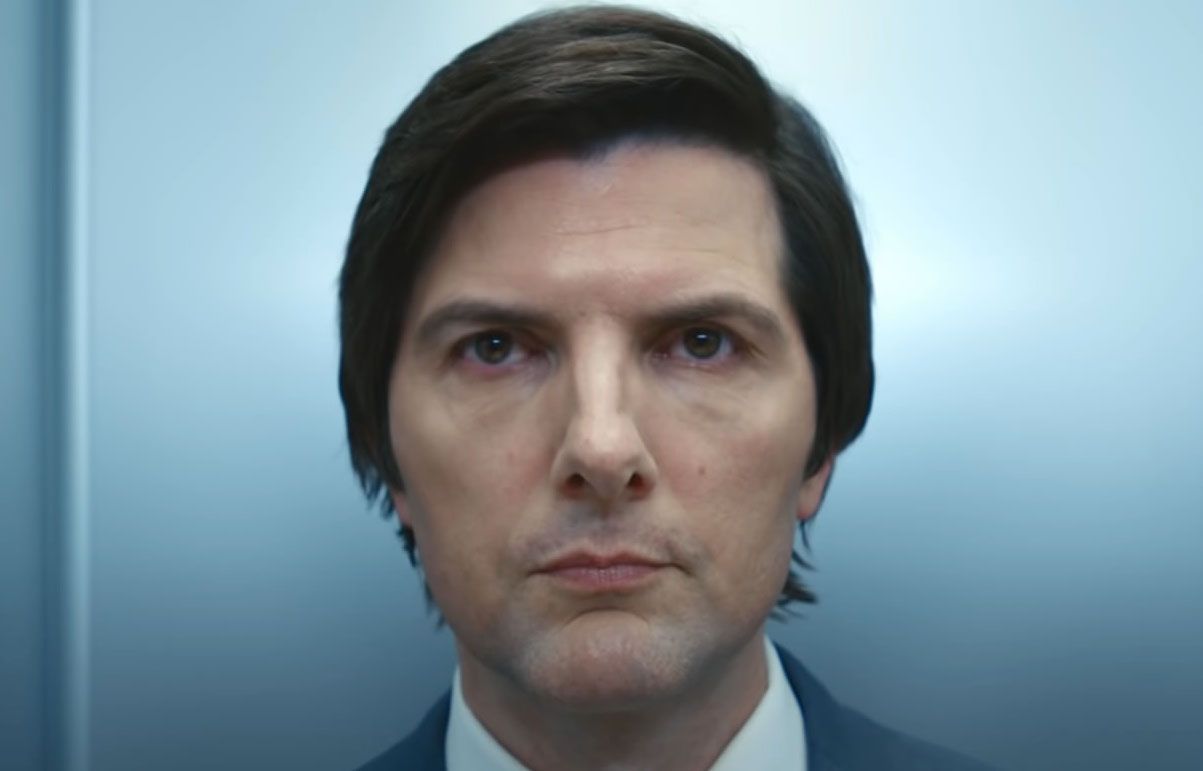The most popular sitcoms of the 10s sweetened our ideas of the work-life balance, but the pandemic crashed the office party. Now, AppleTV+'s Severance has arrived with a biting satire of work culture, exposing the dark underbelly of all those cheerful offices of yore...
It makes sense that so many of the successful TV comedies of the 2000s were set in the workplace; after all, adult Americans spend over a third of their waking hours at work. Hit comedies like 30 Rock and Parks and Recreation transported us to offices chock-full of hilarious and lovable characters. However, Severance poses the question: does this goofy version of work hold up in the age of the "Big Quit?"
From The Office's iconic gags and touching romance to the quirky obsessiveness of Leslie Knope — on the small screen, the cubicle was a place for laughter. Be it in the police precinct of Brooklyn Nine-Nine, the Walmart world of Superstore, or the hospital of Scrubs, there was a therapeutic quality in seeing a lighthearted vision of what "work" could mean. But there's a new office show on, and its Break Room isn't all donuts and Dwight Schrute's survival food.
The Apple TV+ show Severance follows Mark (Adam Scott) after a tragedy in his personal life. An employee of the nebulous Lumon Industries, Mark has elected to undergo "Severance," a controversial procedure separating his work self from his non-work self, effectively creating two separate versions of himself with two different sets of memories. It's not long before both his office self and his outside self begin to question the true nature of the work they are doing, and what the cost of Severance might really be. By twisting the workplace comedy into a dystopian, mind-bending thriller, creator Dan Erickson and Ben Stiller use familiar tropes to create a sense of unease where we used to feel comfort.
Playing With Comedic Tropes
No stranger to comedy himself, referencing the tradition of workplace mockumentary sitcoms was clearly in Ben Stiller's mind while working on Severance. He told the New York Post:
Just the idea of a workplace comedy that has a very specific tone and humor and rhythm to it, [...] shows like ‘The Office’ or ‘Parks and Recreation.’ Those [are] all part of a distinct genre that’s evolved over the last few years that I wanted to play off in the show.
Shows like these presented a fun, optimistic version of the office that allowed us to make light of our own work-related woes. Sure, Liz Lemon always had a fire to put out on NBC's 30 Rock, but she was a workaholic who ultimately loved her job. Michael Scott may have quit (twice), but he adored every last second of being the world's most cringeworthy boss; The Office may be the quintessential version of the workplace comedy, celebrating the growth, empathy, solidarity, and human interaction which can occur at work.
As the '10s wore on, shows like Silicon Valley took a more satirical tone, raising real concerns about ethics and morality in the tech industry and encouraging us to laugh at its characters rather than with them. No more knowing glances at the camera. More recently, the pandemic has directed our scrutiny inward. Now that the lines between home and office are blurred for many of us, we have become disillusioned with work culture entirely. Where is the work-life balance when the workplace is located at home? Is there any going back to the way things were?
Severance's protagonist Mark is played by Adam Scott, who is hard to unsee as the lovable nerd from Parks and Rec, Ben Wyatt, creator of the iconic Cones of Dunshire game. Scott also starred in the short-lived workplace comedy Party Down, a cult favorite soon to be revived on Starz. Scott isn't just a stellar actor, his presence seems to be an intentional nod to the workplace comedy on Erickson and Stiller's part — and it's an incredibly effective one.
Here, Scott plays a willing participant in the system, an eager workaholic who makes dumb jokes with his coworkers and types away at his computer doing... well, what exactly? Sure, we can laugh at Mark's jokes, but we do so with the knowledge that they distract from a grim unknown, lurking just beneath the surface. The known reality is bad enough: Mark's boss (Patricia Arquette) is spying on him and throwing mugs at his head, and his manager (Tramell Tillman) is brainwashing his coworkers. The show's sleek cinematography mimics the clean lines of Lumon's corporate architecture, obscuring as much as it reveals.
A Darker Look
The set design and retro aesthetics of Severance make it impossible to place in time. We are trapped in an uncanny valley between 1950 and 2030; the computer monitors and handbook font suggest the early Apple era, while the green wall-to-wall carpeting and art-deco clocks evoke the heights of mid-century modern. Severance's strikingly generic vision of office space makes its criticisms of capitalism all the more cutting, applicable anytime, anywhere.
It might have its share of puns and office in-jokes (including an especially dark one at the end of Episode 4), but Severance's take on corporate culture and capitalism rejects the charming specificity that made shows like The Office and Parks and Rec so wholesome. The hilariously bland setting of Dunder Mifflin Paper Company and the small-town hokeyness of Pawnee, Indiana were part of their shows' distinct charms. In Severance, the vague, barren walls of Lumon Industries provide no hints about what exactly the "Data Refinement" employees are refining — the employees don't even know themselves (in more ways than one).
This adds to the feeling of pointless monotony that makes Severance feel more like a dark skewering of its lighthearted comedic predecessors than a loving ode. The vending machine snacks are labeled in generic Lumon-brand containers; the cubicles are organized in the center of the room to ensure the employees can all watch each other and make sure they're doing their work. They follow "office protocol" from a 1984-esque guidebook which hails the company's CEO like he's an all-seeing overlord.
Yes, it's still funny, but after seeing the recognizable spaces and phrases of office life transform into something so dystopian, you won't be able to look at a silly office sitcom the same way again. Plus, as network sitcoms become a dying breed, their rosy visions of the workplace seem destined to become fewer and farther between. You can credit Severance with giving the two weeks notice.
Signs of Life
This is not to say the comedic impulses of '10s and '00s TV were completely pro-work — a lot of the catharsis of the workplace comedy comes from its ability to make fun of just how horrible work can be. Michael Scott was an undeniably horrible boss, even if he was extremely entertaining. But it's harder to laugh about work when we realize our work realities are impossible to ignore, and a far cry from the cheerful stories sitcoms tell us.
There are still some holdouts in the genre. ABC's recent network hit, Abbot Elementary, is a workplace mockumentary-comedy that provides a thoughtful and hilarious portrait of the public school system in America. However, its wholesome view of the workplace spares no critique of the meager government funding and support many public schools receive, weaving social commentary into its laughs. No such ambitions came with Parks and Rec's romanticization of local government and 30 Rock's self-referential ode to the entertainment industry. While some have hailed Abbot Elementary as a revival of a near-defunct genre, time will tell if it becomes the harbinger of a new wave of workplace sitcoms, or a nostalgic escape to simpler times.
A New Direction for the Workplace Genre
TV's more direct critiques of corporate and workplace culture weren't always successful with viewers right away. Take Mike White's ill-fated but critically acclaimed 2011 HBO series Enlightened. It follows Amy (Laura Dern), an executive who suffers a nervous breakdown and returns to her job bent on changing her evil employer from within. Naturally, she's immediately transferred to a windowless "data processing" basement, eerily similar to Lumon's bleak "severed floor."
While Amy sought to find fulfillment through dismantling the corporate system entirely, Severance's workers aim to hide from their lives within it. The show's cruelest twist is that everyone on the "severed floor" has made the choice to be there — or at least one version of them has. The very existence of the term "work-life balance" implies that work and life are two entirely different things, and those who elect to undergo Severance are affirming this idea, unaware of its consequences.
Creator Dan Erickson was keen on exploring the mental traps of the idea of work-life balance ever since a realization he had at a miserable desk job of his own. Severance asks us why we would willingly subject ourselves to something that needs to be forgotten in order to be tolerated. This poses the question: do we have the agency under capitalism that we think we do? What exactly are we doing to ourselves?
As attitudes surrounding work change, the media landscape inevitably shifts to reflect these. "No one should be as invested in their boss' bottom line as they are in their own life or happiness," Erickson told Inverse. Maybe, as America careens deeper into the bleak expanse of late capitalism, we are starting to realize that no payout is enough to justify the costs. Perhaps a severance from the old systems of work is coming.

